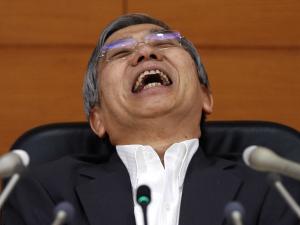– Bank Of Japan’s 10 Trillion Equity Portfolio “Not Large” Says Bank Of Japan (ZeroHedge, March 25, 2015):
As we’ve discussed twice this month, the world has now officially given up any pretensions that Japan’s elephantine QE program isn’t underwriting the rally in Japanese stocks. Not only is the Bank of Japan buying ETFs, they’re targeting their purchases to (literally) ensure that stocks can’t fall by stepping in when things look weak at the open. Unfortunately, Kuroda looks set to run up against the extremely inconvenient fact that while, in his lunacy, he can print a theoretically unlimited amount of money, the universe of purchasable ETFs is limited and so eventually, the BoJ will own the entire market. Here’s what we said last week:
As it turns out, the central bank may now run into the same inconvenience in its efforts to control the stock market that it encountered on the way to monopolizing the JGB market: there’s only so much out there to buy. Here’s more from Bloomberg:
BOJ held 3.85t yen ($32.0b) of ETFs at end-2014 and plans to boost these holdings by 3t yen per year; at this pace, the current market value of 11.5t yen in ETFs would be entirely bought by BOJ by end-2017, data compiled by Bloomberg show.
You read that correctly — the Bank of Japan will own the entire Japanese ETF market within about 30 months. So with all of the JGBs marked for purchase and with all of the ETFs exhausted, there’s only one place to go next: individual stocks.
So with the plunge protection knob cranked to 11, and with the BoJ looking to prove that its central bank insanity setting can be upped to an unprecedented 12 if necessary, we bring you the following from Nikkei:
The Bank of Japan is emerging as the nation’s second-largest stock investor, with its portfolio topping 10 trillion yen ($82.7 billion) in market value this month…
The central bank’s portfolio has a book value of around 5.7 trillion yen. But soaring share prices have lifted its market value past the 10 trillion yen mark — nearly 2% of the tally for all Tokyo Stock Exchange shares.
The figure makes the BOJ second only to the Government Pension Investment Fund, whose portfolio boasted a market value of 27 trillion yen as of December’s end.
Although the central bank does not disclose details of share-buying operations, it frequently steps into the market and buys 30 billion yen to 40 billion yen worth of stocks when equity prices falter in the morning. Its purchases Tuesday reached 35.2 billion yen, underpinning a market that showed signs of a morning struggle. The bank has carried out 20 such operations so far this year.
So after buying 35 billion yen worth of shares yesterday, the BoJ now owns 2% of the entire market and looks set to square off against GPIF (which, as we noted last week, is set to move aggressively into stocks at the implicit urging of the BoJ and the explicit urging of PM Abe) in a battle to become the single largest holder of Japanese equities. Here’s more:
The stock portfolio’s impact on the BOJ’s financial health can no longer be ignored.
The bank’s net worth is 2.8 trillion yen, while its stock portfolio is worth twice that in book value, or 250% more in market value. Japanese megabank Mitsubishi UFJ Financial Group has a net worth of 14 trillion yen, with its stock portfolio amounting to only 5 trillion yen in market value.
The central bank must book losses when stock prices suffer extraordinarily sharp drops, since its financial health could hurt confidence in the Japanese currency.
In other words: the BoJ has no choice but to support the market because if stocks fall, the central bank itself will be in jeopardy. Fortunately, there are still shares out there that the BoJ doesn’t yet own:
“There is ample room for us to buy more shares, but we must keep a vigilant eye on price fluctuation risk,” a senior BOJ official says.
While all of this may sound unequivocally insane, the problem, it turns out, is that just as we can’t understand how Snapchat is worth more than Clorox because we don’t understand the meaning of the term “valuation,” the reason we think the BoJ has been buying a large amount of stock is because we don’t understand the meaning of the term “large.” Here’s BoJ governor Kuroda to explain:
- KURODA: BOJ’S ETF PURCHASES AREN’T LARGE
Well that solves that. And what about the idea that these smallish purchases are supporting the market?
- KURODA: STOCKS AREN’T BEING LIFTED BY BOJ’S ETF PURCHASES
So buying stocks doesn’t lift stock prices. Got it. If you want a second opinion, you can also ask FinMin Taro Aso:
- ASO: BOJ’S BOND BUYS NOT AIMED AT BOOSTING STOCK PRICES
- ASO: MANAGEMENT OF PENSION FUNDS ALSO NOT AIMED AT STOCK PRICES

When government moves into commerce, it is the beginning of the end. One need only look at the US markets to see why such behavior is internecine in the long run. The problem with both the Japanese and US markets is that such behavior can only lead to eventual exposure………….and collapse.
Government can only regulate the way stocks and securities are traded. Once they move in, and act as investor to keep the market afloat…….the truth will eventually will out, and the market will not survive.
Stupid.